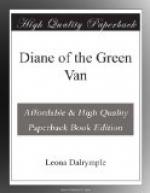CHAPTER XV
JOKAI OF VIENNA
It was insolent music, a taunt in every note. Carl laid aside his flute and inspected his prisoner with impudent interest.
“You are the most difficult person to entertain!” he accused softly. “Here Hunch has strained a sinuous spine performing our beautiful native dances, the tango and the hesitation, and I’ve fluted up all the wind in the room and still you glower.”
“Monsieur,” broke forth the prisoner, goaded beyond endurance by the stifling heat and the stench of Hunch’s pipe, “is it not enough to imprison me here without reason, that you must taunt and gibe—” he choked indignantly and stared desperately at the boarded windows.
“Let your voice out, do!” encouraged Carl. “We dispensed with the caretaker days ago, fearing you’d feel restricted.”
The other’s face was livid.
“Monsieur!” he cried imperiously, his eyes flashing. “Take care!”
“I know,” said Carl soothingly, “that you have deep, dark, sinister possibilities within you—dear, yes! You tried something of the sort on the Ridge Road. That’s why your august head’s so badly bruised. But why aggravate your blood pressure now when it’s so infernally hot and you’ve work ahead. Hunch,” he added carelessly to the admiring henchman who had once dealt away successive slices of his inheritance, “go get a pitcher of ice water and rustle up another siphon of seltzer and some whiskey. Likely His Nibs and I will play chess again to-night.”
Hunch rose from a chair by the window where he had flattened his single good eye against a knot hole, and slouched heavily to the door.
The face of the prisoner slowly whitened. Every muscle of his body quivered suddenly in horrible revulsion. Nights of enforced drunkenness had left his nerves strained to the breaking point.
“Monsieur,” he panted, greatly agitated, “the whiskey—the thought of it again to-night—is maddening.”
Carl merely raised ironical eyebrows.
“You are not a man,” choked the other, shaking. “You are a nameless demon! Such hellish originality in the conception of evil, such singular indignities as you have seen fit to inflict, they are the freaks of a madman!”
“Thank you,” said Carl politely. “One likes to have one’s little ingenuities appreciated.”
“I—I am ill—and the room is stifling.”
“If I do not mind it,” said Carl in aggrieved surprise, “why should you?”
“You are a thing of steel and infernal fire. I am but human.”
“There is a way to stop it all,” reminded Carl, lazily relighting his cigar. “Why not give me a logical reason for your presence in America?”
“I have done so. Have I not said again and again that I am Sigimund Jokai, of Vienna, touring in America?”
“You have said so,” agreed Carl imperturbably, “but you lie. There was an empty chamber in your revolver, you were perilously close to my cousin’s camp. Why? Is it not better to tell me than foolishly to waste such splendid nerve and grit as you possess?”




